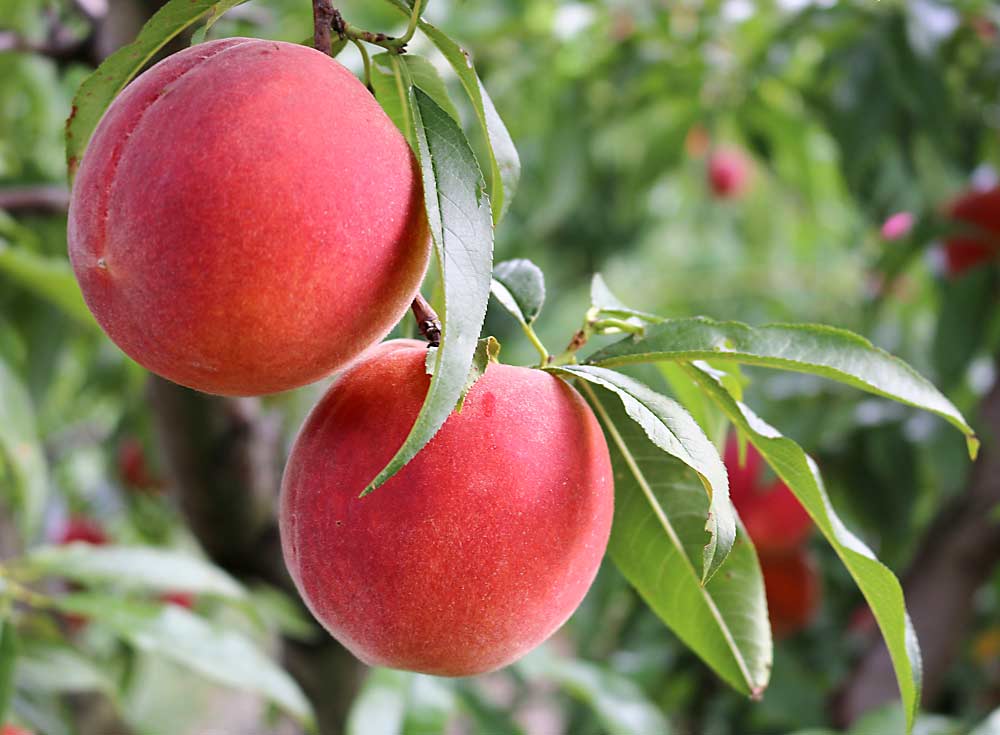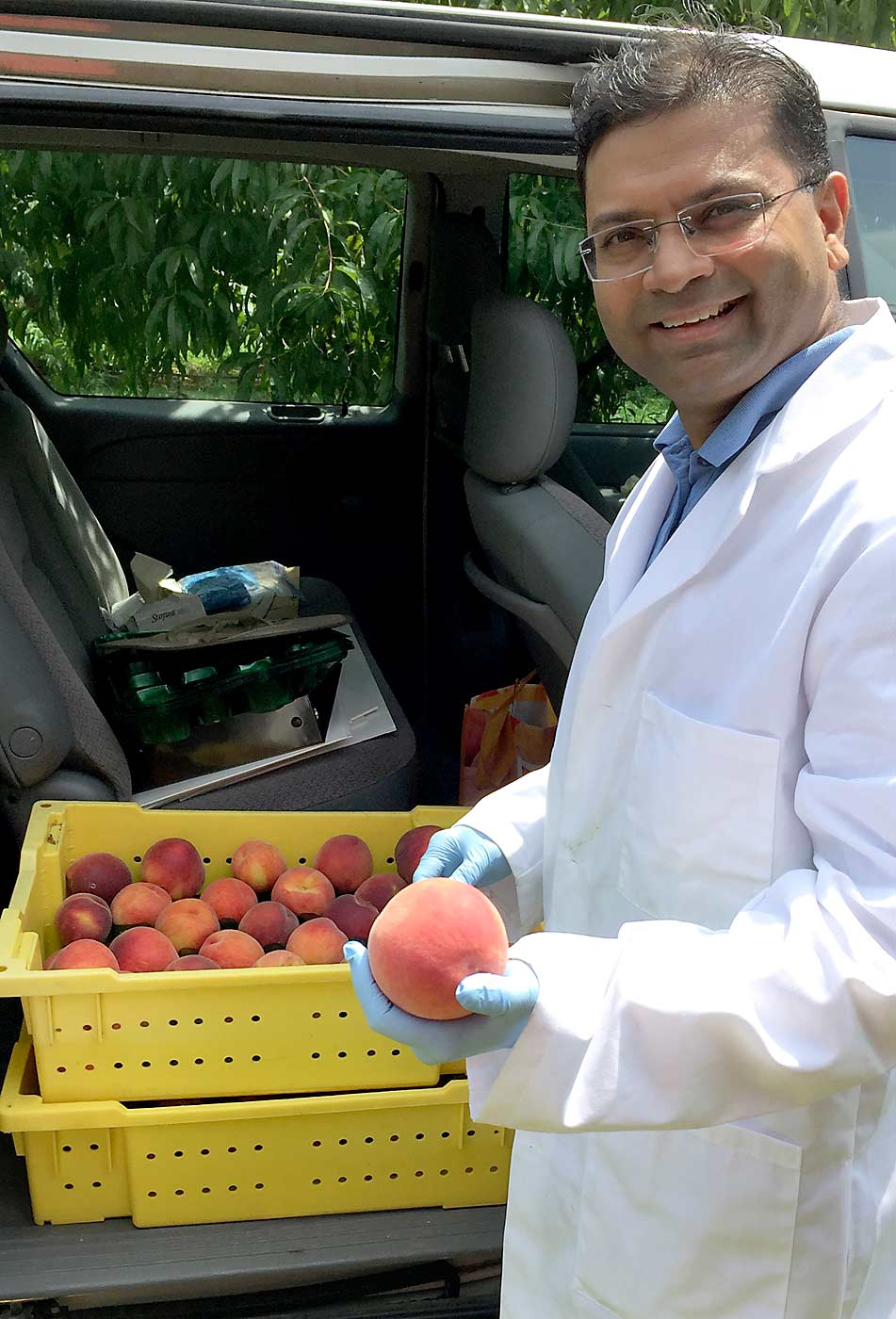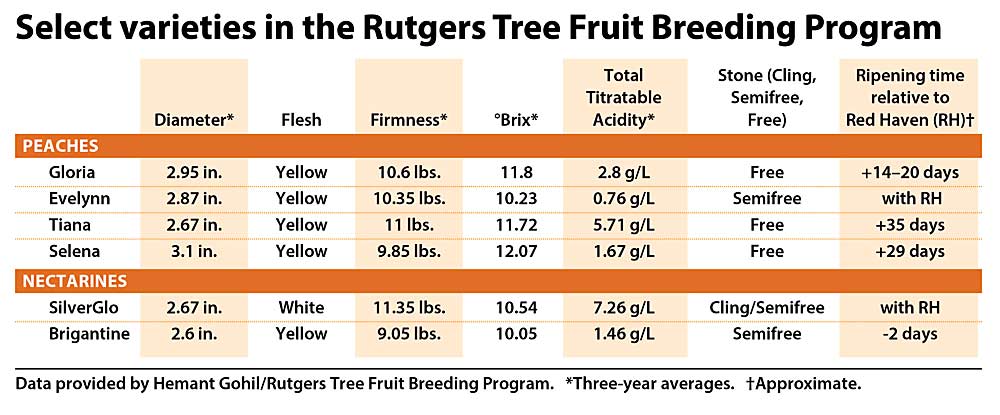
Sometimes called “neat peaches” or “commuter peaches,” new firm-fleshed varieties developed by Rutgers University’s tree fruit breeding program, under the direction of Joe Goffreda, show appeal to consumers who don’t want to snack with a napkin and to growers who want more flexibility.
“These are peaches that don’t squirt juices when you eat them, are crispy and have been selected for a variety of characteristics that are liked by consumers,” said Hemant Gohil, wine grape and fruit extension agent at Rutgers University’s New Jersey Agricultural Experiment Station. “And for growers, they have better hang time, better storage and better shelf life compared to some of the traditional varieties.”
Working with Dan Ward, extension specialist in pomology at the Rutgers Agricultural Research and Extension Center, Gohil has been evaluating several of the firm-fleshed peach varieties in test blocks at the New Jersey Agricultural Experiment Station in Bridgeton and at commercial orchards with different climates.

Gohil is especially pleased with Evelynn and Gloria, which are sweet, yellow-fleshed, firm varieties. Evelynn was released in 2016–17, and Gloria was released in 2008–09, although considerable postharvest research has been done on it in the last five years. Both are also resistant to bacterial spot.
He sees Evelynn as a good semifreestone option for growers who are thinking of replanting Red Haven. While the two ripen at about the same time, Evelynn fares better against bacterial spot and has the larger size (an average diameter of 2.87 inches) that packing companies and retailers often prefer. In addition, he said, Evelynn softens more slowly once its background color changes, so growers have a few extra days of leeway in picking it. It retains its firmness at 18–19 days in storage, making it an excellent shipping peach.
A freestone peach, Gloria allows even more flexibility in picking. Based on tests to determine optimal harvest timing, Gohil said, “You can let Gloria hang for up to seven days (following commercial maturity) and then store it for more than three weeks, and you don’t compromise on quality or firmness.” He noted that he still sees Gloria at fruit stands until late September, which is a full month after commercial maturity.
One more benefit to Gloria in colder climates is its bloom time. Buds begin opening in midseason (around April 15 in southern New Jersey) and continue over the next 10–14 days, so even if a frost does occur that late in the season, it will likely only damage the open flowers, he said. “So, you may lose some of the bloom, but you won’t lose the crop,” Gohil said. “We have seen this in New Jersey, and a North Carolina agent said the same thing: Gloria was one of the few varieties that was not hurt by a late 2017 frost.”

“Completely different beast”
Firm varieties are a good addition to the peach lineup, said Bill Shane, senior extension tree fruit specialist at Michigan State University’s Southwest Michigan Research and Extension Center. “These very firm, slow-melting peaches are a completely different beast from traditional peaches, though, so retailers and direct marketers need to educate customers,” he said. For instance, consumers need to know that firm peaches can be ripe when they still feel hard and that they won’t soften, even if set on a windowsill for a few days.
Another characteristic that might surprise first-time buyers is the acidity difference, which affects taste. While Red Haven has an acidity that typically tops 5.5 grams per liter, Evelynn’s acidity falls at just 0.76 grams per liter. This presents an opportunity to market the lower acidity to those consumers who appreciate it, Shane said. “In fact, I know there’s a grower out by South Haven who is catering to Asian-background buyers because of the low-acid characteristic,” he said.
Not all of the firm peaches have low acidity, however. Gohil pointed to the new Rutgers variety, Tiana, which has 5.71 grams per liter of total titratable acidity. This productive, late-season variety harvests after Gloria (mid-September in southern New Jersey) and exhibits low bacterial-spot susceptibility.
“Some of our growers have already had consumers try Tiana they had in test blocks, and they said they really liked it,” he said. “The late season needs an outstanding variety like this.”
Beyond fresh-eating firmness, the neat peaches show a few other differences compared to traditional varieties. Shane said that customers who do canning have reported that Gloria isn’t amenable to the hot-water-bath method for quick peeling, and some have even returned peaches for that reason. With good education and marketing efforts, he thinks those issues should abate.
“These new peaches are different, so I applaud the idea of having a new term like the ‘neat peach’ so people know what they are getting and aren’t disappointed,” he said.
The neat peach name was Ward’s idea and hasn’t been trademarked, but Gohil agreed that some moniker such as that would be helpful for marketing the firm peaches, which are available through a sole licensee, Adams Nursery, as well as sublicensed nurseries. Overall, he said, “These new, exciting, neat varieties look outstanding.”
—by Leslie Mertz






Leave A Comment